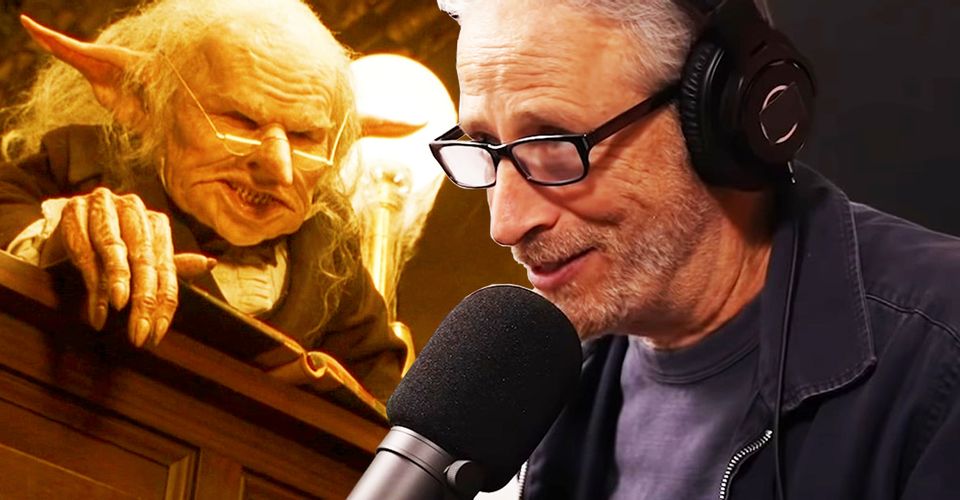Jon Stewart’s Harry Potter Controversy Explained

Jon Stewart’s Harry Potter controversy stems from the interpretations of comments that the comedian made during a December 2021 episode of The Problem with Jon Stewart podcast. Following the episode, digital media outlets such as Variety and Newsweek claimed that Stewart accused the already controversial Harry Potter author J.K. Rowling of being anti-semitic because of how goblins are depicted in the highly popular fantasy series. However, there is actually much more to the story.
In the world of viral media, Jon Stewart’s Harry Potter controversy is the perfect storm. Ever since Stewart took over hosting duties at The Daily Show in 1999, his name has been synonymous with political and news satire. At the same time, some other critics have separately accused the goblins in Harry Potter of being anti-semitic, due to their on-screen portrayal. This, in turn, follows previous accusations of transphobia against acclaimed fantasy author Rowling, tarnishing the series’ legacy for some fans.
Jon Stewart’s Harry Potter controversy is essentially a result of all these factors coming together to create something viral. Adding fuel to the fire is the fact that J.K. Rowling was notably missing from the Harry Potter reunion special, which was released early in 2022. Here’s a breakdown of every crucial factor regarding the controversy.
Jon Stewart’s Harry Potter Controversy Explained

In December 16, 2021, Stewart discussed the evolution of the Jewish bar mitzvah with writers Henrik Blix and Jay Jurden on his podcast The Problem with Jon Stewart. According to Stewart, bar mitzvahs used to be simple and private events, until they blew up to become “Gatsby-esque.” In the context of political satire, Stewart explains how modern and increasingly ostentatious bar mitzvahs have come to carry the message, “The Jews have arrived. And we are going to dazzle you with the access.” Jurden then chimes in by asking Stewart which chapter of Harry Potter“The Jews have arrived” can be found in. This prompts Stewart to go off on a comedic rant, comparing the goblins that run the underground bank in Harry Potter to the caricatures of Jews found within anti-semitic literature. Stewart is known for taking comedy seriously, and this type of edgy material is well within his purview, as established during his Daily Show tenure.
While doing a satirical impression of J.K. Rowling in the context of a comedic podcast conversation, Stewart points to an imaginary copy of the fabricated anti-semitic text “The Protocols of the Elders of Zion” and says, “Can we get these guys to run our bank?” Following this comedy bit in The Problem with Jon Stewart, in the morning of January 4, Newsweek released a story titled “Jon Stewart Accuses J.K. Rowling of Antisemitism in ‘Harry Potter’.” The story immediately went viral, likely propped up by the fact that the recent Harry Potter reunion didn’t include J.K. Rowling, which itself was a viral story. In response, on January 6, Stewart released a video on his Twitter account with the caption, “Newsweek et al, may eat my ass.” In the video, Stewart clarifies that the controversial conversation in question was purely comedic, and that if any political context is to be drawn from the bit, it is that “some tropes are so embedded in society that they are basically invisible, even in a considered process like movie-making.” Here’s more of what Stewart said:
“I do not think J.K. Rowling is anti-semitic. I did not accuse her of being anti-semitic. I do not think that the Harry Potter movies are anti-semitic. I really love the Harry Potter movies, probably too much for a gentleman of my considerable age. I would just like to say that none of that is true, and that a reasonable person could not have looked at that conversation and not found it lighthearted.”
Why Some People Say Harry Potter’s Goblins Are Anti-Semitic

The depiction of goblins in Harry Potter seems to mirror how Jewish people were caricatured in anti-semitic propaganda from the late 1800s to the early 1900s. This applies not just to the goblins’ hook-nosed faces and hunched bodies, but also to their actions across the Harry Potter series. Amid the threatening events in Harry Potter and the Goblet of Fire and the convoluted plot of the war in Deathly Hallows, for instance, the goblins were not only more concerned with their money over people’s lives, they even handled finances for the Death Eaters. Moreover, Hagrid, who is known for seeing the good in all types of creatures, offers this warning early in the series: “They’re goblins, Harry. Clever as they come, goblins, but not the most friendly of beasts.” These apparent parallels to the historically bigoted depictions of Jewish people explain why the Harry Potter controversy carries so much weight.
Responses To The Harry Potter Anti-Semitism Controversy

On the other hand, echoing Jon Stewart’s comments on the matter, some argue that the similarity between Harry Potter‘s goblins and Jews isn’t an indication that J.K. Rowling is anti-semitic, but rather a symptom of a deeper cultural problem. Indeed, many of the elements in Harry Potter are derived from long-standing fantasy tropes. These tropes are often cultural products from a time in which anti-semitism was more overtly prevalent. J.R.R. Tolkien’s The Lord of the Rings, on which many of the existing tropes in Harry Potter and many other popular fantasy franchises can be traced, is itself an interpretation of pre-existing literature and propaganda, many of which were anti-semitic. In short, the other side of the argument postulates that Rowling didn’t intend for goblins to be directly similar to racist caricatures of Jews. Rather, Harry Potter‘s goblins are a product of how anti-semitism has become so deeply embedded into modern culture that it’s become practically invisible, even to academically-discerning best-selling authors who have a history of supporting Jewish communities. Curiously, while hook-nosed and hunched caricatures that can be traced back to anti-semitic propaganda are present in a great number of modern media, it’s notable that Harry Potter‘s Lord Voldemort himself didn’t even have a nose, and has been described by Rowling as partly inspired by Adolf Hitler.
On January 5, after the podcast episode but prior to Stewart’s response, The Times of Israel released a story about how Jewish figures came to Rowling’s defense “after comedian Jon Stewart alleged that the author’s goblin characters were clearly antisemitic.” British Jewish comedian David Baddiel, who is known for being vocal against anti-semitism, said this: “The goblins in Harry Potter need to be seen not in a simplistic #teamRowling vs #antiteamRowling way but in a many-centuries long, deeply subconsciously embedded cultural context.”
About The Author

















